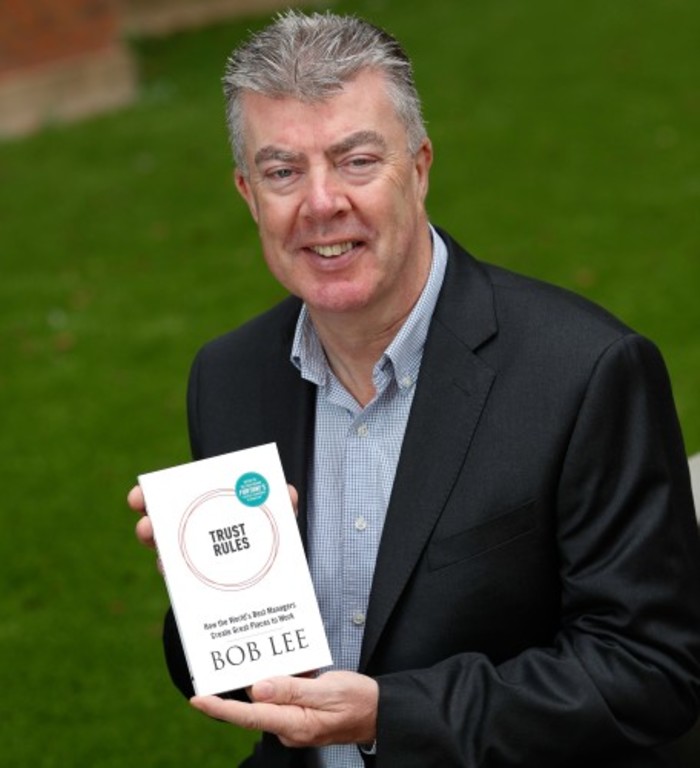'Grand, one-off gestures don't make a great workplace. It's the tiny things'
This author delivers a masterclass in building trust with staff.
EVERY ORGANISATION has a culture – ‘the way we do things around here’ – and it’s the manager’s behaviour and attitudes that dictates how work gets done.
Some managers opt for a ‘command and control’ style – tell employees exactly what to do and how to do it, and stand over them to make sure that they follow the instructions to the letter. That’s crude, rarely effective and soul-destroying for all involved.
Other managers choose to bring out the best in their people, recognising them as intelligent humans who, given encouragement and support, will do a far better job than anything that can be achieved through micromanagement.
What’s the difference between the two approaches? I analysed survey responses from two million employees in 80 countries and found that the key element is trust.
When you put ‘building trust’ at the heart of everything that you do, your employees become less concerned about trying to figure out your motives and protecting what they have and will bring their best to the table instead.
The higher the level of trust within an organisation – of any size – the better the results.
To give you an example, Fortune magazine commissioned research on the performance of their ‘100 best companies to work for’ against the S&P 500 index.
They found that over an 18-year period to 2016, the S&P share price grew by more than 240% while an investment in the ‘best companies’ swelled by more than 700% during the same period.
 Bob Lee
Bob Lee
When it comes to building high-trust workplaces, everybody thinks that it’s easier for everyone else to do.
SMEs often argue that it’s harder for them because they have smaller pockets. They’ll often lament the difficulties they have hiring workers because large companies suck up the ‘best people’ and they can’t compete on pay and benefits.
But larger companies are often envious of the greater flexibility enjoyed by small- and mid-sized firms, who tend not to have the bureaucracy or regulations that large companies often face.
In reality, it doesn’t cost anything to build trust with workers – you don’t have to spend thousands on team-building and doling out perks.
Trust isn’t built through grand or expensive one-off gestures, but through careful attention to getting the basics right.
Keep your promises
Doing what you say you will do is the first requirement for trust, and yet you’d be amazed at how many employees report that their boss doesn’t keep promises.
Managers are often astounded to hear that. They protest that they always pay staff on time and give them their holiday entitlements. But those are big promises they’re legally obliged to keep. It’s the small, overlooked promises that are often broken.
A simple rule of thumb – it’s a promise if the person hears it as a promise.
“Let me have a think about it” is a promise. It’s also often manager-speak for, “Let me forget about it.” But from the employee’s perspective, you’ve made a commitment to reflect and then get back to them.
It might sound cynical, but the best way to break less promises is to make less promises. Better a simple ‘no’ today than a long apology tomorrow.
Don’t rush headlong into making impossibly tight commitments. Instead, ask questions like “When do you need an answer?” or “What’s your deadline on this?”
As managers, we often commit to doing something in ‘five minutes’ when maybe it’s not needed for five days. So ask before you promise, and then clarify to make sure that you each have a shared understanding of your commitment.
How does a manager bring out the best in people?
Show appreciation for hard work and good results. It’s almost impossible to thank or praise too much.
I’ve yet to hear any employee complain that they get too much praise in work. You don’t need to make a huge fuss, just do it as soon as you notice something praiseworthy. When it comes to recognition, ‘free, simple and often’ is the way to go.
Be specific in your praise. Don’t just tell your colleague that they did a great job. Tell them how they did a great job. It’s a really important distinction.

The former can come across as a patronising pat on the head, whereas telling somebody exactly what it is that you appreciate about their efforts reinforces the message about the behaviours that matter and achieve results.
And don’t do a Late Late Show on it. If you have a word of praise for everyone in the audience you may as well praise nobody.
Don’t ever praise somebody just for the sake of praising. Everyone sees through it and it reduces the impact of the sincere praise that you offer at other times.
How’s your ‘closed door’ policy working out?
No manager ever boasts of having a ‘closed door policy’. It seems as though every manager’s door is constantly propped open to demonstrate accessibility and availability.
The problem is that although the doors are always open the minds are often closed.
Checking your email or fiddling with your phone while a colleague is talking to you is a closed-door action. So is looking over their shoulder at what’s going on outside.
You bring out the best in your people by being there for them, paying attention and showing by your actions that this person matters to you.

If now is not a great time to talk, explain that and ask if you can chat to them later. Agree a time – and don’t even think about breaking that promise.
Being open to the idea that an employee can come into your office if they want to talk to you does not mean that you are approachable and easy to talk to.
Get away from your desk, walk around for at least a few minutes every day to facilitate casual, unplanned encounters with your team. Relationships are built in those casual encounters.
Start new workers on a Tuesday
They say first impressions matter, so it’s astonishing just how bad some companies are at welcoming new workers.
Typically, new employees start at 9am on a Monday, which is possibly the worst time for senior managers because they’re often tied up in meetings and trying to plan the week ahead.
I’ve heard stories of new hires kept waiting around for hours on their first day or not having someone to greet them when they arrive at their desk. I also know people who waited over a week before they were even assigned a desk, or an email address, or a key card.
You probably invest a huge amount of time and effort into hiring people, so don’t let that good work go to waste.
Plan your new employee’s first days. Make them feel like they are the most important hire you’ve ever made. Don’t act surprised when they show up – and of course, make sure you’re there to greet them.
Why not start your next new recruit at 12pm on a Tuesday when you can give them your full attention and celebrate their new role?
Bob Lee is the author of Trust Rules. This article was written in conversation with Conor McMahon as part of a series of masterclasses with some of Ireland’s most influential business people.
If you want to share your opinion, advice or story, email opinion@fora.ie.






